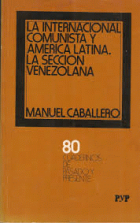
Part of Series
Authors

Rossanda was born in Pula (Croatia), then part of Italy. She studied in Milan and was a pupil of philosopher Antonio Banfi. At a very young age, she took part in the Italian resistance and, after the end of World War II, she entered the Italian Communist Party (PCI). After a short period, secretary Palmiro Togliatti named her responsible of culture in the party. She was elected for the first time in the Italian Chamber of Deputies in 1963. In 1968 she published a small essay, entitled L'anno degli studenti ("The Year of the students"), in which she declared her support to the youth movement. Rossanda was part of a minority inside PCI that was against the Soviet Union, and, together with Luigi Pintor, Valentino Parlato and Lucio Magri founded the party and newspaper il manifesto. This caused her expulsion from the Communist Party after its XII National Congress held in Bologna. At the 1972 elections, Il Manifesto obtained only the 0,8% of the votes. It therefore merged with the Proletarian Unity Party, forming the Proletarian Unity Party for Communism. She later abandoned party politics but kept her role as director of il manifesto. Rossanda is currently is a member of the editorial board of Sin Permiso.

Paul Marlor Sweezy (April 10, 1910 – February 27, 2004) was a Marxist economist, political activist, publisher, and founding editor of the long-running magazine Monthly Review. He is best remembered for his contributions to economic theory as one of the leading Marxian economists of the second half of the 20th century. Paul Sweezy was born on April 10, 1910 in New York City and attended Phillips Exeter Academy. He went on to Harvard and was editor of The Harvard Crimson, graduating magna cum laude in 1932. Having completed his undergraduate coursework, his interests shifted from journalism to economics. Sweezy spent the 1931–32 academic year taking courses at the London School of Economics, traveling to Vienna to study on breaks. It was at this time that Sweezy was first exposed to Marxian economic ideas. He made the acquaintance of Harold Laski, Joan Robinson and other young left-wing British thinkers of the day. Upon his return to the United States, Sweezy again enrolled at Harvard, from which he received his doctorate degree in 1937. During his studies, Sweezy had become the "ersatz son" ("ersatz" meaning "replacement" in German) of the renowned, Czech-born economist Joseph Schumpeter, although on an intellectual level, their views were diametrically opposed. Later, as colleagues, their debates on the "Laws of Capitalism" were of legendary status for a generation of Harvard economists. While at Harvard, Sweezy founded the academic journal The Review of Economic Studies and published essays on imperfect competition, the role of expectations in the determination of supply and demand, and the problem of economic stagnation. Sweezy became an instructor at Harvard in 1938. It was there that he helped establish a local branch of the American Federation of Teachers, the Harvard Teachers' Union. In this interval also Sweezy wrote lectures that later became one of his most important works of economics, The Theory of Capitalist Development (1942), a book which summarized the labor theory of value of Marx and his followers. The book was the first in English to deal with such questions as the transformation problem thoroughly. Sweezy worked for several New Deal agencies analyzing the concentration of economic power and the dynamics of monopoly and competition. This research included the influential study for the National Resources Committee, "Interest Groups in the American Economy" which identified the eight most powerful financial-industrial alliances in US business. From 1942 to 1945, Sweezy worked for the research and analysis division of the Office of Strategic Services. Sweezy was sent to London, where his work for the Office of Strategic Services (OSS) required his monitoring British economic policy for the US government. He went on to edit the OSS's monthly publication, European Political Report. Sweezy received the bronze star for his role in the war. He was the recipient of the Social Science Research Council Demobilization Award at war's end. Sweezy wrote extensively for the liberal press during the post-war period, including such publications as The Nation and The New Republic, among others. He also wrote a book, Socialism, published in 1949, as well as a number of shorter pieces which were collected in book form as The Present as History in 1953. In 1947 Sweezy quit his teaching position at Harvard, with two years remaining on his contract, to dedicate himself to full-time writing and editing. In 1949, Sweezy and Leo Huberman founded a new magazine called Monthly Review, using money from historian and literary critic F. O. Matthiessen. The first issue appeared in May of that year, and included Albert Einstein's article "Why Socialism?". The magazine, established in the midst of the American Red Scare, describes itself as socialist "independent of any political organization". Monthly Review rapidly expanded into the production of books and pamphlets through its publishing arm, Monthly Review Press


